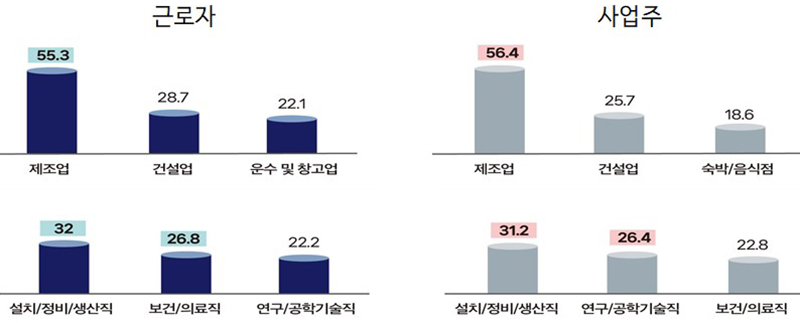Ministry of Employment and Labor announces results of ‘working hours survey’… The 52-hour workweek system has largely been established.
Lee Seong-hee, Vice Minister of Employment and Labor, said on the 13th, “While maintaining the current framework of the 52-hour workweek, we will push for an improvement in the system that gives labor and management the option to choose overtime management units, rather than limiting them to one week, only for necessary industries and occupations, if desired.” revealed.
On this day, Vice Minister Lee explained the results of a survey on working hours and said, “While the 52-hour workweek is largely established, it appears that some industries and occupations are experiencing difficulties.”
Accordingly, he added, “We will provide safety measures that can fundamentally resolve field concerns about long working hours and health rights issues,” along with granting the option of overtime management units to industries and occupations that require it.
In addition, he emphasized, “We will focus our administrative capacity on eradicating ‘free overtime’ so that workers can receive fair compensation for their work in the labor market.”
Meanwhile, the Ministry of Employment and Labor conducted a ‘survey on working hours’ targeting 6,030 people through in-person interviews, and also went through the process of fully explaining the related system and questions to the survey subjects to increase the accuracy of the results.
This survey was divided into a labor-management policy demand survey and a public perception survey to understand the overall perception of working hours and prepare reform measures.
As a result, the 52-hour workweek (statutory 40 hours + 12 hours of overtime) has largely been established, but some industries and occupations still face difficulties.
First, 48.2% of respondents responded that the 52-hour workweek system was ‘helpful in resolving long working hours,’ while 54.9% responded that ‘it is difficult to reflect diverse demands by industry and occupation.’
In a survey asking companies that experienced real difficulties due to the 52-hour workweek how to respond, the companies responded by using inclusive wages (39.9%), hiring additional workers (36.6%), giving up on orders (30.6%), and ignoring laws and regulations (17.3%). %), etc.
Meanwhile, there were more responses from both labor, management and the general public agreeing to the plan to expand the unit period of overtime work than disagreeing. In particular, when limited to certain industries and occupations, the difference in ratios between agree and disagree responses appeared even larger.

Results when expanding the overtime management unit (left) and applying it only to some industries and occupations
Specifically, in response to the question ‘In what fields do overtime work management units need to be reorganized?’, manufacturing and construction industries had the highest scores.
In terms of occupation, both labor and management showed a high percentage of responses saying that reorganization was necessary in installation/maintenance/production, health/medical, and research/engineering/technical positions.
Accordingly, the government humbly accepted the public opinions expressed in this survey and decided to maintain the current 52-hour workweek framework.
However, we plan to discuss supplementary measures with labor and management to allow labor and management to select overtime management units if they wish for some industries and occupations that are experiencing difficulties in the field.
In addition, for the industries and occupations subject to reform, it was decided to establish safety measures to resolve concerns about long working hours and health rights issues.
In particular, as there are many opinions that both labor and management should set an upper limit on weekly working hours and introduce 11 hours of continuous rest per working day to guarantee workers’ health rights, we plan to prepare a reasonable plan based on the results of this survey.
In addition, we will establish various measures to ensure that you are compensated for your work. We plan to present an effective plan that can satisfy both labor and management, taking into account the demands and practices of the field and various interests that have been formed over a long period of time.
Along with the results of this survey, the government announced the results of planning and supervision conducted on workplaces suspected of misusing inclusive wages from January to August.
This supervision was conducted on 87 workplaces suspected of illegal misuse of comprehensive wages after being reported through the labor community and anonymous reporting centers. 64 workplaces (73.6%, KRW 2.63 billion) in unpaid wages and 52 workplaces (59.8%) in violation of overtime limits. ) were detected and administrative and judicial action was taken.
In addition, in the future, we plan to operate an anonymous reporting center to ensure fair compensation for the work done, and continue to conduct active labor supervision to improve incorrect practices in the field.
In addition, for small and medium-sized businesses that have difficulty managing working hours, an attendance record management program is provided on the Ministry of Employment and Labor’s website (http://www.employment.gov/) to enable on-site labor and management to autonomously and transparently manage working hours.www.moel.go.kr) is provided free of charge.

Industries (above) and occupations (below) that are considered necessary to expand overtime management units
Vice Minister of Employment and Labor Lee Seong-hee reaffirmed the government’s position that it will not unilaterally pursue the reform of the working hour system, saying, “As we will form a national consensus through social dialogue between labor, management, and government, I hope that not only management groups but also labor groups will participate in the dialogue and have substantive discussions.” “I look forward to it,” he said.
He added, “The government will quickly initiate empirical data analysis and additional fact-finding surveys to select industries and occupations that require reform of the working hour system and support labor-management-government dialogue.”
Source:
Ministry of Employment and Labor Wage and Working Hours Policy Division
Policy news, link


Comments